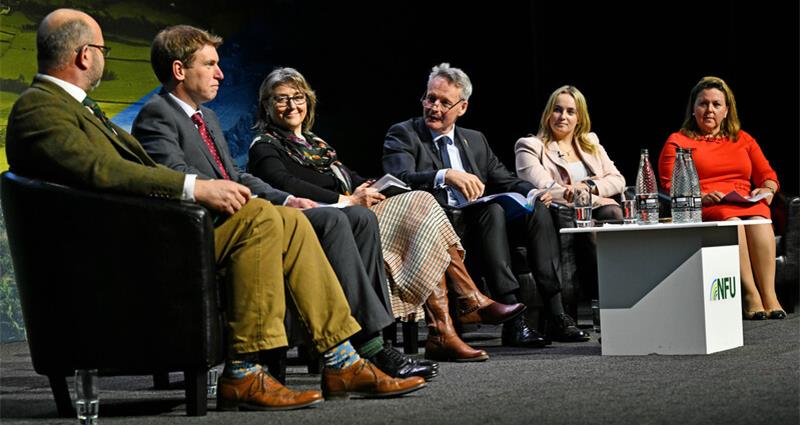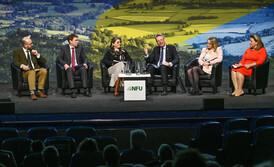In the final session of NFU Conference 2023, NFU Vice President David Exwood introduced five farmers who described their journeys towards climate-friendly farming.
Efficiencies and economics tended to be the drivers behind most farmers’ move towards environmentall-friendly farming practices.
Jake Freestone, Stephen Doble, Marion Regan, Helen Dent and Clare Morgan each described the challenges they faced on their farms.
It became clear that a one-size fits all approach does not work.

Jake Freestone – economic drive
Economics were the driving factor behind Overbury Enterprises embracing a regenerative farming system ten years ago. Farm manager Jake used findings from his Nuffield scholarship to develop the plan that would see the farm halving its carbon emissions from crop establishment and with forecasts to spend ÂŁ270,000 less on machinery costs.
Overbury is a 1,590 hectare in-hand farming operation, LEAF demonstration farm with 1,000 outdoor lambing ewes.
“With my Nuffield scholarship in 2013 I went around the world and came back with the philosophy that we have not been managing the soil effectively as we could be.
“No-till was the first bit that we really went into, but no-till won’t work on its own. Lots of people told me that, we tried it in the 70s, what are you doing. So you need cover cropping to do that and that keeps the soil alive, it keeps photosynthesis going – we all farm the sunshine.”
Rotations are vital and it comes down to traditional farming techniques, including grasses, break crops and brassicas all in rotation on the three soil types.

Stephen Doble – managing extremes
With his arable land on drought-prone gravelly soils, but permanent grazing on the Thames flood plain, a climate smart business for Oxfordshire mixed farmer Stephen Doble has meant cutting its exposure to extreme weather at both ends of the spectrum.
The balance has been a challenge – a focus on mitigating drought threats to early summer grain fill worked until 2014 but when the business was faced with three months of flooding and managed 12 tonnes of silage instead of 400.
“I’d overstocked and it was a really expensive mistake,” Stephen said.
A reduction in cattle numbers reduced fertiliser use and allowed a shed to be used for a storage diversification, followed by a switch to a Sainsbury’s contract, where Stephen doesn’t own the cattle but is paid per kilo of weight.
However, the gamechanger has been in grazing management, including the installation of 2,000m of water pipes that have improved grass recovery, cut inputs and allowed cattle to be moved onto new grazing faster.

Marion Regan – resilience
Marion Regan is a fifth generation farmer who works 720 hectares of Kent land with one third as soft fruit under polytunnels using a peat-free substrate, one third arable and the rest managed for the benefit of wildlife with field margins, permanent grass meadows, woodlands and pollinator mixes.
“We grow about 6,000 tonnes of strawberries, raspberries and blackberries and we have always had to be super resilient in berry farming: weather events, market movements, geo political events which affect labour and a highly perishable crop all combine to send us curve balls all the time. But in all my time farming, this is the most clear existential crisis that we are now facing and it’s in three parts. One is climate change crisis, the second is a loss of biodiversity (the nature crisis), and the third is soaring inflation and reduced margins.”
The group is trialling exciting renewable power projects into our tunnels, harvesting robots in the tunnels as well as constantly trialling new varieties.

Helen Dent – future proof
Agronomist Helen Dent specialises in soils and carbon auditing, but began the journey to net zero on her 200-cow dairy farm near Penrith in 2020 “without really knowing it”, driven by a “big ambition” to boost an average 9,500-litre milk yield and to future-proof, financially and in terms of labour.
Changes that have boosted average milk yield to 11,500l has included new housing to improve animal health, a robotic system milking 3.3 times a day, and a strong focus on nutrient management, liming and soil health.
With efficiency has come impressive climate credentials and a reduction from 1.43kg of CO2 equivalent per kg of milk to 0.99.
“These are long term commitments that need investment and we need to see that that’s ok, that we are getting it back and are rewarded for cutting our carbon footprint, whether that be through the supply chain or government,” Helen said.

Clare Morgan – diversification
Clare Morgan and her husband, Steven, bought a 350-acre derelict Pembrokeshire farm in 1999 and turned it into a mixed farm, which has diversified into tourism.
“Now, if you had asked us 16 years ago what type of farmers we were we would have been very traditional and we would have said potatoes, arable and livestock. However, if you ask us that same question today, we will give you the answer of: we farm eggs, people (tourism), sunshine and livestock."
They have 64,000 free-range hens, 150 fattening cattle, 400 Aberfield cross-bred breeding ewes.
They have converted 15 of their stone barns into short-term lets and in 2020 they diversified into tourism. Clare finds that tourists enjoy staying on a working family farm and their renewables help with marketing.
They have a 350kw biomass boiler providing heat for the properties and grain store, a 120kw ground mounted solar panel system for the hen sheds, providing one third of their energy needs. And they have signed a 30-year lease for a 47mw solar farm.
Mrs Morgan said that planning restrictions and lack of electrical grid infrastructure has reined in their ambitions.
Meet the speakers from this session
David Exwood
NFU Deputy President
David farms south of Horsham in West Sussex with his wife and two sons over 1200 tenanted hectares in the heart of the Sussex Weald.
Starting in 1989 with 70ha the business now has arable, dairy beef, Sussex suckler herd and sheep enterprises. In 2003 the Farm Shop opened and sells a wide range of food from the Victorian stable yard at Westons.
He has served previously within the NFU as Branch Chair, West Sussex Council Delegate, South East Regional Chair as well as four years on Governance Board.
David was elected to the position of NFU Deputy President in February 2024.
Responsibilities
- EU and international relations
- Banking
- Biodiversity
- Food labelling
- Food safety
- Food service and hospitality
- Agricultural transition (productivity, ELMs, stability)
- Plant health
- Assurance schemes
- British Agriculture Bureau
- Health, safety and wellbeing
- Agricultural transport
- Uplands
- Tenants


